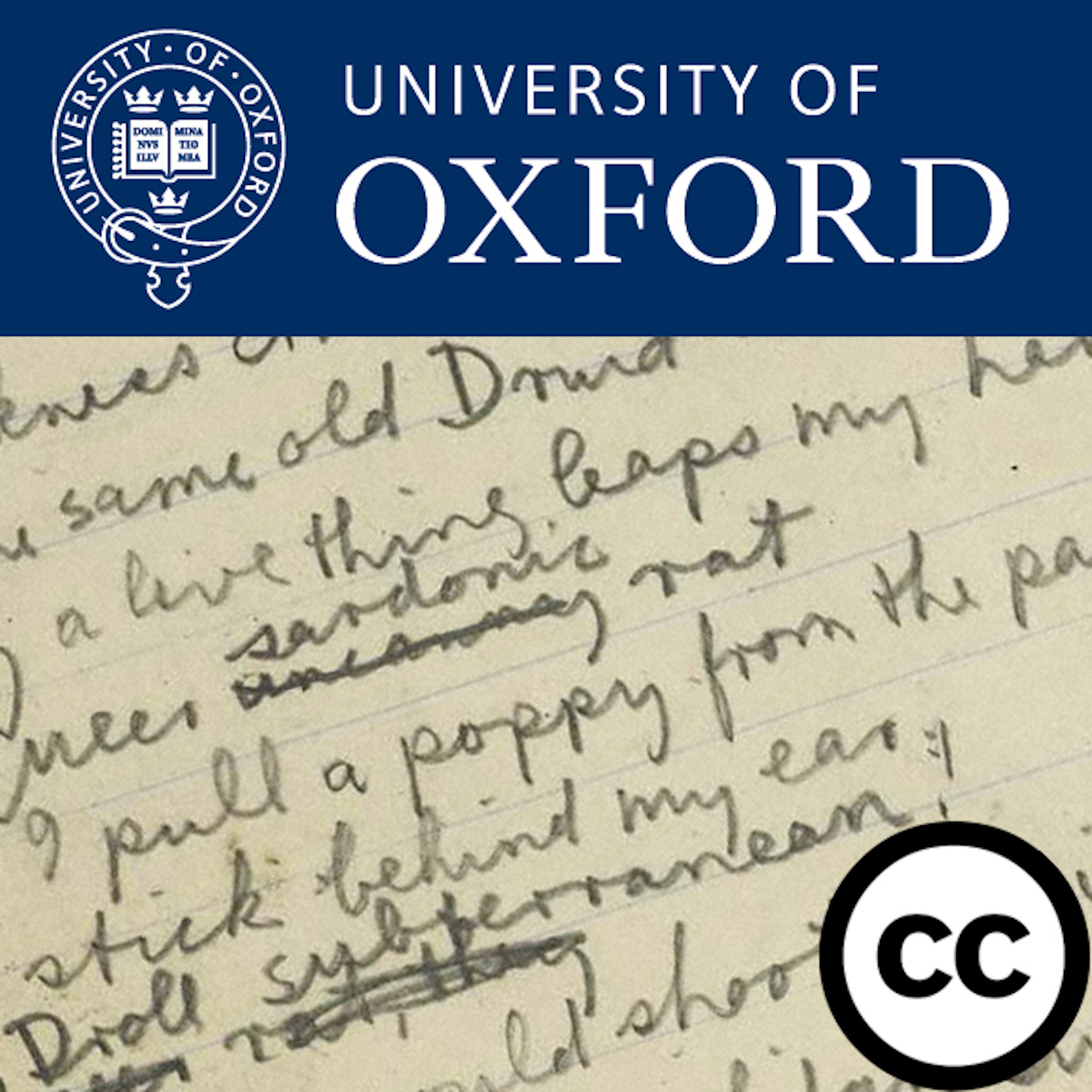Episodes
Margi Blunden, daughter of Edmund Blunden, talks about her father and his work. Creative Commons Attribution-Non-Commercial-Share Alike 2.0 UK: England & Wales; http://creativecommons.org/licenses/by-nc-sa/2.0/uk/
Published 09/22/14
Adrian Barlow looks at the impact of World War One poets in the years immediately following the War, in late 20s and early 30s, and as we embark on the 100 year anniversary of the conflict. Adrian Barlow is the President of the English Association and series editor of Cambridge Contexts in Literature. Previously he was Director of Public and Professional Programmes at the University of Cambridge Institute of Continuing Education. Creative Commons Attribution-Non-Commercial-Share Alike 2.0 UK:...
Published 09/22/14
World War One was a conflict of empire, not of nation. In this lecture Dr Simon Featherstone looks at four distinctive poets who provide a version of empire that is much more nuanced than the imperial rhetoric of the established canon. Dr Simon Featherstone is Principal Lecturer in Drama Studies at De Montfort University with a specialism in postcolonial studies; Englishness; national identities; and war poetry. Creative Commons Attribution-Non-Commercial-Share Alike 2.0 UK: England &...
Published 09/22/14
Meg Crane looks at the war poems of Siegfried Sassoon, framed by the first and last (non-war) poems of his literary career. Meg Crane is a teacher and President of the Siegfried Sassoon Fellowship. Creative Commons Attribution-Non-Commercial-Share Alike 2.0 UK: England & Wales; http://creativecommons.org/licenses/by-nc-sa/2.0/uk/
Published 09/22/14
Professor Gerald Dawe relates the Irish poetry of World War One to the history of Ireland itself and explores why the first anthology of Irish WW1 Poetry was only published in 2008. Professor Gerald Dawe is the Director of the Oscar Wilde Centre for Irish Writing and Director of M.Phil in Creative Writing at Trinity College Dublin. He is the editor of the first anthology of Irish war poetry 'Earth Voices Whispering: Irish war poetry 1914-1945 (2008)'. Creative Commons...
Published 09/22/14
Often overlooked, Dr Stuart Lee introduces David Jones and his seminal work 'In Parenthesis'. Creative Commons Attribution-Non-Commercial-Share Alike 2.0 UK: England & Wales; http://creativecommons.org/licenses/by-nc-sa/2.0/uk/
Published 09/22/14
Professor Jon Stallworthy, editor and biographer of Wilfred Owen, introduces one of the most notable poets of World War One. Creative Commons Attribution-Non-Commercial-Share Alike 2.0 UK: England & Wales; http://creativecommons.org/licenses/by-nc-sa/2.0/uk/
Published 09/22/14
Author and editor, Jean Liddiard, presents the life and work of Isaac Rosenberg. Creative Commons Attribution-Non-Commercial-Share Alike 2.0 UK: England & Wales; http://creativecommons.org/licenses/by-nc-sa/2.0/uk/
Published 09/20/14
Dr Philip Lancaster presents the life of literary musician Ivor Guney, and introduces some the key themes in his poetry. Philip Lancaster is a writer and composer, a leading textual and critical scholar specialising in early twentieth century music and poetry, and a solo baritone and consort singer. He is a current Finzi Scholar, and a British Academy Postdoctoral Research Fellow at the University of Exeter. Creative Commons Attribution-Non-Commercial-Share Alike 2.0 UK: England & Wales;...
Published 09/20/14
In this short talk Dr Stuart Lee introduces some of the primary sources of World War One poetry: manuscripts. Visit Oxford's online First World War Poetry Digital Archive to explore the manuscripts of the major British World War One poets (http://www.oucs.ox.ac.uk/ww1lit). Creative Commons Attribution-Non-Commercial-Share Alike 2.0 UK: England & Wales; http://creativecommons.org/licenses/by-nc-sa/2.0/uk/
Published 09/20/14
What place do the poets and their work have in the historical analysis of the War? Dr Stuart Lee takes a look at the debate. Creative Commons Attribution-Non-Commercial-Share Alike 2.0 UK: England & Wales; http://creativecommons.org/licenses/by-nc-sa/2.0/uk/
Published 09/20/14
Dr Charles Mundye takes a look at how Robert Graves' experiences and feelings about War that influenced his poetic career. Dr Charles Mundye is Head of Academic Development at the Department of Humanities, Sheffield Hallam University. He has research interests in British and American literature of the twentieth and twenty-first centuries, and is President of the Robert Graves Society.
Creative Commons Attribution-Non-Commercial-Share Alike 2.0 UK: England & Wales;...
Published 09/18/14
Dr Jane Potter looks at a range of women poets who wrote during, and in the years that followed, World War One. Dr Jane Potter's research and teaching focuses on book and literary history. Her monograph Boys in Khaki, Girls in Print: Women's Literary Responses to the Great War 1914-1918 (OUP 2005; paperback 2007) was joint winner of the 2006 Women’s History Network Book Prize and she has published widely on many aspects of war literature, book history, and women's writing. She is a trustee...
Published 09/18/14
Dr Guy Cuthbertson takes an in-depth look at the poet Edward Thomas. Creative Commons Attribution-Non-Commercial-Share Alike 2.0 UK: England & Wales; http://creativecommons.org/licenses/by-nc-sa/2.0/uk/
Published 09/15/14
Dr Stuart Lee discusses the popular poetry of the War years and the formation of the canon in the years that followed. Creative Commons Attribution-Non-Commercial-Share Alike 2.0 UK: England & Wales; http://creativecommons.org/licenses/by-nc-sa/2.0/uk/
Published 09/15/14
Dr Stuart Lee gives a short introduction to the poetry movements that led up to the War. Creative Commons Attribution-Non-Commercial-Share Alike 2.0 UK: England & Wales; http://creativecommons.org/licenses/by-nc-sa/2.0/uk/
Published 09/15/14
Dr Alisa Miller looks at the popular poets in the early years of the War and the way that the press and publishing worlds created a commercial culture in support of the conflict. Alisa Miller is Research Fellow at the University of Chichester. Her work is concerned with how individuals understand and reconcile war as both a private and a public experience, and the cultural artifacts that they create in order to explain and contextualise extraordinary experience of violence. Creative Commons...
Published 09/14/14
Dr Mark Rawlinson explores the relationship between War and War Poetry using Owen's famous 'Preface' as the starting point. Dr Mark Rawlinson is a Reader in English Literature at the University of Leicester, working on nineteenth- and twentieth century literature, especially narrative fiction and poetry. His research has a particular focus on the literature of war. Creative Commons Attribution-Non-Commercial-Share Alike 2.0 UK: England & Wales;...
Published 09/14/14
Published 09/14/14


